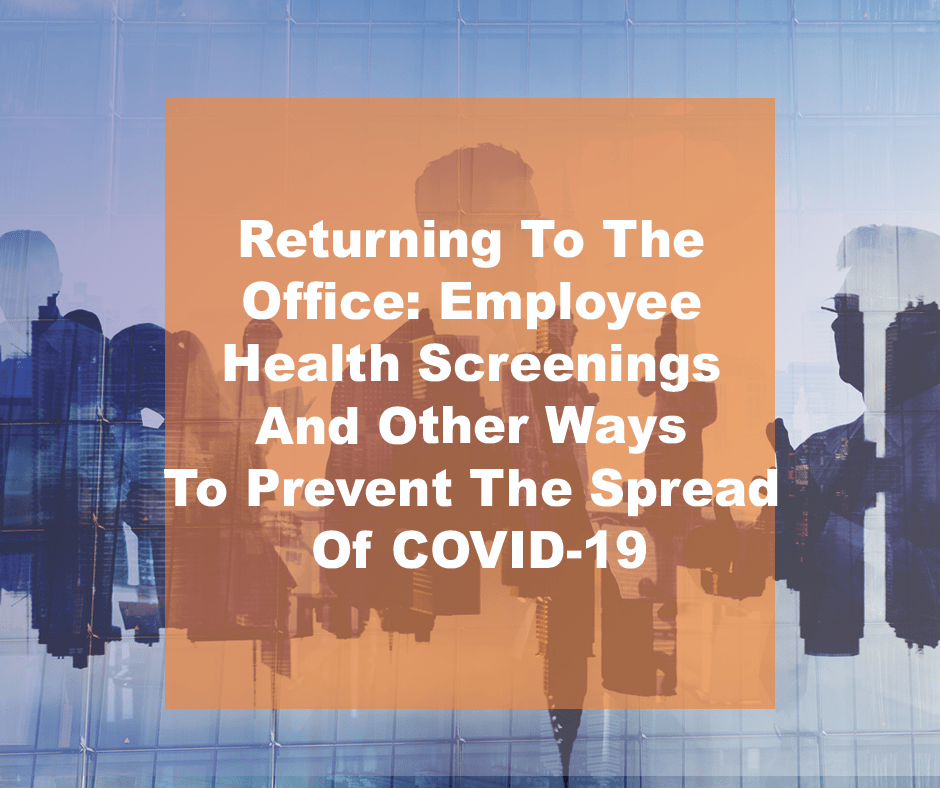Returning to the office has proven to be challenging for employers. Organizations of all sizes are struggling to determine which employee health screenings they can execute without infringing on their employees’ rights. From scheduled questionnaires to employee temperature checks, employers are working hard to adapt to this new normal.
Employee health screenings need to be voluntary. Hourly employees should be considered on the clock if they are waiting in line for testing and while the test is being administered. If an employee is sent home because they are ill they should be paid for the time out of work, if possible. If the employee refuses to take the test or respond to the survey, it is within your rights as an employer to send them home without pay.
Temperature Checks
Before COVID-19, temperature checks were considered to be a part of a medical exam. Employers need to follow the following rules to ensure that employee health screenings are minimally invasive and confidential.
Health screenings are voluntary but a necessary way for employers to best protect the entire workforce. Reassure your employees that these screenings are completely private and confidential. If your business does not have an on-site nurse, determine which employee will be responsible for taking the other employees’ temperatures.
Employees should be considered on the clock while waiting in line for and while the test is being administered. If an employee is sent home ill they should be paid for the time out of work if possible. If the employee refuses to take the test, it is within your rights as an employer to send them home without pay.
Additional Safety Measures
Cloth-Face Masks
Cloth Face masks are not appropriate substitutes for workers who must wear N94 respiratory masks or medical/surgical face masks. A cloth face mask should cover the nose and mouth to contain the wearer’s potentially infectious respiratory droplets. Cloth face masks will not protect the wearer from airborne transmissible infectious agents due to their lack of seal or inadequate filtration. (Click here to view the CDC Recommendations for Masks and Cloth Face Coverings)
Provide employees with guidelines of when they can and cannot take off their masks. For example, some office employees may not be required to wear their mask at their desks, but do need to wear them in common areas while food service employees may be required to wear their masks their entire shifts. Make sure to express these guidelines and requirements to your employees. Address any concerns they may have regarding the new policy. Post these new guidelines and rules throughout the business in places where employees can see them.
Keeping a minimum 6-ft distance between workers
Employees should keep a minimum of 6 ft away (two arms lengths away) from each other. Workspaces should allow employees to sit a comfortable distance away from other employees. If needed, consider rearranging the workspace and adding additional protective barriers for employees. Businesses considering to reopen should consult the “Reopening the workplace during a pandemic” decision chart released by the CDC.
Keep Common Areas and Surfaces Clean
While returning to your office space, be aware of how often you’re cleaning. You might be questioning if you’re cleaning enough. Wiping down shared areas multiple times a day with the proper cleaning products is one way to help prevent the spread of the coronavirus.
- Clean AND disinfect frequently touched surfaces daily. This includes common areas, tables, doorknobs, light switches, countertops, handles, desks, phones, keyboards, toilets, faucets, and sinks.
- If these surfaces appear to be dirty, wash them with soap and water before using chemical disinfectants. The EPA released this list of common household disinfectants that will help prevent the spread of COVID-19
Still want more info on how to carefully reopen your business in a Post-COVID19 world? Contact A Risk Advisor at 914-357-8444.
